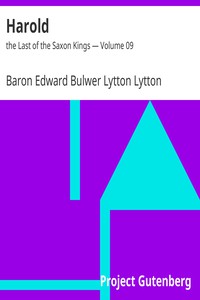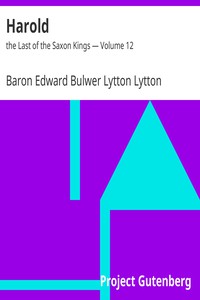Harold : the Last of the Saxon Kings — Complete, Lytton [best e reader for academics .txt] 📗

- Author: Lytton
Book online «Harold : the Last of the Saxon Kings — Complete, Lytton [best e reader for academics .txt] 📗». Author Lytton
CHAPTER V.
CHAPTER VI.
CHAPTER VII.
CHAPTER VIII.
CHAPTER IX.
CHAPTER X.
BOOK XI.
CHAPTER I.
CHAPTER II.
CHAPTER III.
CHAPTER IV.
CHAPTER V.
CHAPTER VI.
CHAPTER VII.
CHAPTER VIII.
CHAPTER IX.
CHAPTER X.
CHAPTER XI.
CHAPTER XII.
BOOK XII.
CHAPTER I.
CHAPTER II.
CHAPTER III.
CHAPTER IV.
CHAPTER V.
CHAPTER VI.
CHAPTER VII.
CHAPTER VIII.
CHAPTER IX.
NOTES
FOOTNOTES
DEDICATORY EPISTLE
TO THE RIGHT HON. C. T. D’EYNCOURT, M.P.
I dedicate to you, my dear friend, a work, principally composed under your hospitable roof; and to the materials of which your library, rich in the authorities I most needed, largely contributed.
The idea of founding an historical romance on an event so important and so national as the Norman Invasion, I had long entertained, and the chronicles of that time had long been familiar to me. But it is an old habit of mine, to linger over the plan and subject of a work, for years, perhaps, before the work has, in truth, advanced a sentence; “busying myself,” as old Burton saith, “with this playing labour—otiosaque diligentia ut vitarem torporen feriendi.”
The main consideration which long withheld me from the task, was in my sense of the unfamiliarity of the ordinary reader with the characters, events, and, so to speak, with the very physiognomy of a period ante Agamemnona; before the brilliant age of matured chivalry, which has given to song and romance the deeds of the later knighthood, and the glorious frenzy of the Crusades. The Norman Conquest was our Trojan War; an epoch beyond which our learning seldom induces our imagination to ascend.
In venturing on ground so new to fiction, I saw before me the option of apparent pedantry, in the obtrusion of such research as might carry the reader along with the Author, fairly and truly into the real records of the time; or of throwing aside pretensions to accuracy altogether;—and so rest contented to turn history into flagrant romance, rather than pursue my own conception of extracting its natural romance from the actual history. Finally, not without some encouragement from you, (whereof take your due share of blame!) I decided to hazard the attempt, and to adopt that mode of treatment which, if making larger demand on the attention of the reader, seemed the more complimentary to his judgment.
The age itself, once duly examined, is full of those elements which should awaken interest, and appeal to the imagination. Not untruly has Sismondi said, that the “Eleventh Century has a right to be considered a great age. It was a period of life and of creation; all that there was of noble, heroic, and vigorous in the Middle Ages commenced at that epoch.” 1 But to us Englishmen in especial, besides the more animated interest in that spirit of adventure, enterprise, and improvement, of which the Norman chivalry was the noblest type, there is an interest more touching and deep in those last glimpses of the old Saxon monarchy, which open upon us in the mournful pages of our chroniclers.
I have sought in this work, less to portray mere manners, which modern researches have rendered familiar to ordinary students in our history, than to bring forward the great characters, so carelessly dismissed in the long and loose record of centuries; to show more clearly the motives and policy of the agents in an event the most memorable in Europe; and to convey a definite, if general, notion of the human beings, whose brains schemed, and whose hearts beat, in that realm of shadows which lies behind the Norman Conquest;
“Spes hominum caecos, morbos, votumque, labores, Et passim toto volitantes aethere curas.” 2I have thus been faithful to the leading historical incidents in the grand tragedy of Harold, and as careful as contradictory evidences will permit, both as to accuracy in the delineation of character, and correctness in that chronological chain of dates without which there can be no historical philosophy; that is, no tangible link between the cause and the effect. The fictitious part of my narrative is, as in “Rienzi,” and the “Last of the Barons,” confined chiefly to the private life, with its domain of incident and passion, which is the legitimate appanage of novelist or poet. The love story of Harold and Edith is told differently from the well-known legend, which implies a less pure connection. But the whole legend respecting the Edeva faira (Edith the fair) whose name meets us in the “Domesday” roll, rests upon very slight authority considering its popular acceptance





Comments (0)